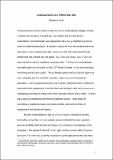Files in this item
III - Contractarianism as a political morality
Item metadata
| dc.contributor.author | Sachs, Benjamin Alan | |
| dc.date.accessioned | 2018-06-02T23:32:36Z | |
| dc.date.available | 2018-06-02T23:32:36Z | |
| dc.date.issued | 2016-05-26 | |
| dc.identifier | 240546862 | |
| dc.identifier | b488d98a-756d-45c0-ab32-c389f9425a84 | |
| dc.identifier | 85009464466 | |
| dc.identifier.citation | Sachs , B A 2016 , ' III - Contractarianism as a political morality ' , Proceedings of the Aristotelian Society , vol. 161 , no. I , pp. 49–67 . https://doi.org/10.1093/arisoc/aow001 | en |
| dc.identifier.issn | 0066-7374 | |
| dc.identifier.other | ORCID: /0000-0002-2307-7620/work/69029285 | |
| dc.identifier.uri | https://hdl.handle.net/10023/13679 | |
| dc.description.abstract | Contractarianism initially made its mark, in the seventeenth century, as a sort of theory of everything in ethics. But gradually philosophers became convinced that there were resources available outside contractarianism for settling important moral questions—for instance, ideas of human rights and the moral equality of persons. Then Rawls revived contractarianism with a more modest aim—namely, as a theory of justice. But even this agenda for contractarianism has been called into question, most notably by G.A. Cohen, who contends that we have other tools at our disposal for identifying the true conception of justice. So the question remains: how should contractarianism be construed if it is to provide answers to questions that cannot be answered in some other way? In my essay I offer a very simple answer: contractarianism should be construed as a political morality. I arrive at this answer by starting with contractarianism as a theory of everything and paring away the unappealing layers of contractarianism so understood. I begin by describing what contractarianism is. Then I dispense with contractarianism as a theory of state legitimacy, as a theory of interpersonal morality, and as a theory of justice. Finally, I distinguish political morality from the other already-mentioned areas of morality, and argue that contractarianism is a sensible theory of its grounds. | |
| dc.format.extent | 162280 | |
| dc.language.iso | eng | |
| dc.relation.ispartof | Proceedings of the Aristotelian Society | en |
| dc.rights | © 2016 The Aristotelian Society. This work is made available online in accordance with the publisher’s policies. This is the author created, accepted version manuscript following peer review and may differ slightly from the final published version. The final published version of this work is available at https://dx.doi.org/10.1093/arisoc/aow001 | en |
| dc.subject | B Philosophy (General) | en |
| dc.subject | BDC | en |
| dc.subject.lcc | B1 | en |
| dc.title | III - Contractarianism as a political morality | en |
| dc.type | Journal article | en |
| dc.contributor.institution | University of St Andrews.Philosophy | en |
| dc.contributor.institution | University of St Andrews.Institute of Legal and Constitutional Research | en |
| dc.identifier.doi | 10.1093/arisoc/aow001 | |
| dc.description.status | Non peer reviewed | en |
| dc.date.embargoedUntil | 2018-06-02 |
This item appears in the following Collection(s)
Items in the St Andrews Research Repository are protected by copyright, with all rights reserved, unless otherwise indicated.

